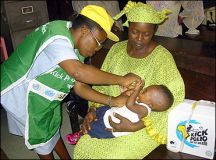Unrest in Ivory Coast, Sudan threatens anti-polio drive: WHO
GENEVA, Nov 16 (AFP) — The global campaign to eradicate polio is being threatened by unrest in Ivory Coast, a World Health Organisation official said.

|
|
A child is being administered with a polio vaccine. Africa needs to coordinate vaccination campaigns for its children on a regional level, Senegalese President Abdoulaye Wade told a conference on immunisation and child health.(AFP/File). |
“We are now threatened by the conflict situation that we are seeing in a couple of the key countries, especially Ivory Coast and Sudan,” Bruce Aylward, coordinator for the WHO’s polio eradication programme.
The WHO is launching the second phase of its immunisation campaign in 24 sub-Saharan African countries on Thursday, aiming to vaccinate 80 million under five year-olds.
However, Aylward said the campaign should be able to go ahead in Ivory Coast from November 18 to 22.
“At this point, all factions on the ground have said they want to go ahead with the activity and there may be delays by some days because the logistics will be more complex,” he added.
Foreign staff who were due to oversee the vaccinations in the west African country have been evacuated to neighbouring Ghana because of the recent surge in anti-foreigner violence and the civil war in Ivory Coast.
The country’s economic capital, Abidjan, also houses the global polio campaign’s coordination centre for central and west Africa.
Fifteen cases of polio have been reported in Ivory Coast this year against one case in 2003.
The WHO said the conflict in Sudan’s western region of Darfur had helped polio regain a foothold in the country since March 2003.
Nineteen cases have been reported in the east African country this year, although the country was reported to be polio-free in 2001.
Aylward said the first phase of the immunisation campaign against polio in Africa had been successful, especially in northern Nigeria.
“The number of cases is dropping. The epidemic is starting to come under control,” he told journalists.
About 75 percent of the children targeted in the Nigerian state of Kano were vaccinated after local leaders lifted their opposition to the polio vaccine.
The region had become a reservoir for polio in recent years after local religious leaders opposed vaccinations, allowing the disease to grow and spread to neighbouring countries.
Aylward said the global campaign against polio was still short of 35 million dollars for 2005.
He warned that the WHO might have to postpone its next immunisation campaign in Africa, or reduce its scope in Afghanistan, Pakistan, Niger, Nigeria and Egypt unless there was more funding.
